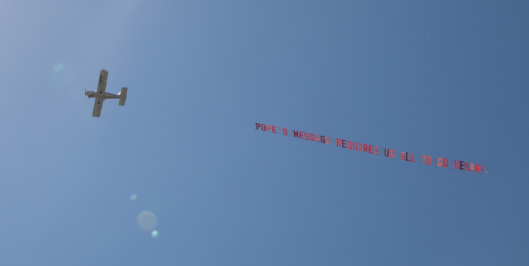Over at my other blogging “home” at the journal Political Theology‘s There Is Power in the Blog, I posted the following brief reflection as the first contribution to a series this week on Ten Years after 9/11:
In the immediate wake of the horrific attacks on September 11, 2001, a number of Christian theological ethicists questioned whether a “war on terrorism” was the most effective, let alone ethical, response. To be sure, many theological ethicists approached the question of how to deal with the threat of terrorism through the traditional lenses of either pacifism or just war theory. From both camps, however, some proposed that a “police” or “law enforcement” type of approach instead ought to be taken.
For example, Catholic theological ethicists Lisa Sowle Cahill, a just-war theorist, and Michael Baxter, a pacifist, in a joint interview that appeared in U.S. Catholic magazine soon after the American-led military action in Afghanistan, agreed on this point. As Baxter put it, “I think the most interesting proposals have been to see this as more of a police action, in which the United States and other countries are going to round up a criminal who has committed a crime against humanity.” For her part, Cahill commented, “While our government has chosen to respond with war, I think Father Baxter and others have made an interesting suggestion that it might be better to look at it as a police action.” Similar to Cahill, Catholic just-war ethicist J. Bryan Hehir, in an article, “What Can Be Done? What Should Be Done?” that appeared in America magazine in October 2001, wrote, “But beyond the rhetoric there lie serious reasons to distinguish war from what is ahead of us. Even if one is convinced that there must be a military dimension to an effective response to terrorism, it is better not to locate the whole effort under war.” And like Baxter, Christian pacifist Stanley Hauerwas, in an interview conducted by Jim Wallis at Sojourners, responded that he “would certainly like to start envisioning the possibility of that kind of police force” as a less violent alternative to war for dealing with terrorists. These are but a few of the theological ethicists who called for what political theorist and just-war expert Michael Walzer refers to as the “’dial 911’ response to 9/11.”
Theological ethicists weren’t alone, even if they were a minority, in suggesting more a police than a military response to the threat of terrorism. For instance, in an op-ed on “Why Terrorists Aren’t Soldiers” published in the New York Times on August 8, 2007, General Wesley K. Clark and Kal Raustiala criticized the Bush administration for treating members of al Qaeda as “unlawful combatants” rather than as criminals. In their view, it was a mistake to dignify “criminality by according terrorist killers the status of soldiers.” Although terrorism occupies some sort of murky space between war and crime, and the line between combatant and civilian is blurred, calling them combatants elevates their status. According to Clark and Raustiala, terrorism instead “should be fought first with information exchanges and law enforcement, then with more effective domestic security measures,” and “only as a last resort should we call on the military….” Terrorists “ought to be pursued, tried and convicted in courts.”
As a theological ethicist myself, but as one who has a law enforcement background (and who was a reserve police officer in Des Moines, Iowa, when 9/11 happened and remembers vividly our heightened sense of alertness in the months that followed), I was keenly interested in these burgeoning calls for approaching the problem of terrorism in a way more akin to policing. Of course, as I pointed out in a number of places over the decade since, not all policing is just policing. Police states and police brutality cannot be what proponents of a police approach have in mind for dealing with terrorists. Moreover, there are a number of approaches to policing that are to be found—from a militaristic crime-fighter model to a social-peacekeeper model—so that those who call for a police approach to responding to terrorism need to be clear about what kind of policing they have in mind. I, along with Gerald Schlabach (and others), have proposed just policing, which I regard as congruent with a social-peacekeeper or community policing model. This approach shares much in common with the just peacemaking paradigm that Glen Stassen has given traction to in recent years, but it is important to note that just policing still involves the use of force, including lethal force, governed by strict criteria analogous to the principles of the just-war tradition (e.g., last resort, proportionate force, noncombatant immunity, etc.). Thus, not all pacifists are in agreement about whether or to what extent they support just policing, even though Hauerwas (echoing John Howard Yoder) believes that “a police force is the best institutionalization of what just war should be about” and, as such, less violent than the war approach the US embarked upon following 9/11.
Ten years out from 9/11, it seems to me that terrorism has indeed been best addressed by such a policing approach. In Spain, Germany, the United Kingdom, France—and in the U.S.—police and intelligence have successfully prevented the carrying out of many terrorist plots. To be sure, as the lethal shooting of the twenty-seven-year-old Brazilian Jean Chalres de Menezes by London police who mistook him for a suicide bomber in 2005 demonstrates, there have also been examples of unjust policing this past decade. Hopefully, in the years to come, more will be done to institute and implement just policing as a more effective and ethical way for preventing and responding to terrorism.




Tobias, I think there is a need for a clarification in this post concerning the relationship between policing and war. I think it is one thing to say that policing is a type of response different from a military response, for example the point of view you describe that a police response to 9/11 would have been more effective than a military one. It is another thing to say that policing should be the paradigm for our understanding of the just war, which is what the quote from Hauerwas near the end suggests (I might be wrong, but I don’t know the context of the quote). I am not saying these two points are not mutually incompatible, just that they are different. Do you agree?
Second, I think I disagree with the overall point of the post. It might make sense to say that a police response would have been a better response to 9/11 if al-Qaeda was based in Germany, but they were based in Afghanistan, where they had the open support and cooperation of the de facto Taliban government. I have never seen an adequate explanation of how exactly al-Qaeda members were supposed to be arrested. Aside from the practical issue, what law would the police force be enforcing? You might say international law, but international law is a matter of diplomatic relations among states, not something that can be enforced against individuals, except in special cases like a war crimes trial.
Also, by aiding and abetting what would have been an act of war if carried out by a government, I think it is logical to say that the Taliban engaged in an act of war against the US, so on those terms a war with Afghanistan was justified. Once that war began, al-Qaeda members began fighting on the battlefield alongside the Taliban. Therefore, regardless of whether the 9/11 attack itself would be better considered a criminal act than an act of war, al-Qaeda members were now undeniably also combatants in an armed conflict and therefore if they were captured on the battlefield should have been treated like combatants. Individual terrorists held as combatants might be given criminal trials if there was sufficient evidence they had been engaged in terrorist acts or their planning, but there is no reason why this must be the case.
I agree that things get murkier on the issue of al-Qaeda members captured in the U.S. U.S. legal precedent (Ex parte Quirin) says that agents of a belligerent on U.S. soil can be considered combatants, but this raises the specter of abduction and imprisonment without the due process we have come to expect. I know I do not have the answers to this problem, but I don’t think the solution is to treat terrorism as an issue of crime demanding a police response when that does not fit the situation.
Thanks, Matt, for taking a little time to comment.
First, in my view the difference between just policing and just war is one of degree rather than kind. On this, Gerald Schlabach and I may be in some disagreement. In my view, international just policing may include a military component (as with the “responsiblity to protect” (R2P), which I see as a move in this direction.
I indeed did only “describe” the police response that others suggested in response to 9/11; I did not elaborate on what I thought would be the most effective/ethical response to that particular terrorist attack. You are correct about al-Qaeda in Afghanistan, harbored by the de facto Taliban government. I do think more intelligence in advance of the US attack there might have led to a more surgical action to apprehend or kill bin Laden et al. But this would still have been a military action rather than done by police. You are right to note the current situation with international law. Anyhow, here I think that a precise response in accordance with just war criteria would have been what Yoder had in mind when he said that genuine just war would look more like (just) policing.
Most of what I wrote here merely reported on what a number of prominent persons said 10 years ago about a police type of response rather than some “war” on terrorism. In much of what I’ve written I have been rather critical of such calls as being rather naive or too optimistic. Towards the end of this post, though, I do note (and I should pull together the list of examples I’ve been keeping) that the best successes in preventing and stopping terrorism since 9/11 have been through domestic and international (by this I mean cooperation between agencies in various nations, as well as institutions such as INTERPOL) law enforcement actions–and I stand by this. Again, this doesn’t necessarily exclude some military responses, as long as these comply with the just war criteria strictly. If and when international law develops to address the murky questions you’ve rightly raised–and if and when an enforcement mechanism is developed–then I think we’ll have something that makes “just war” look more like “just policing.”